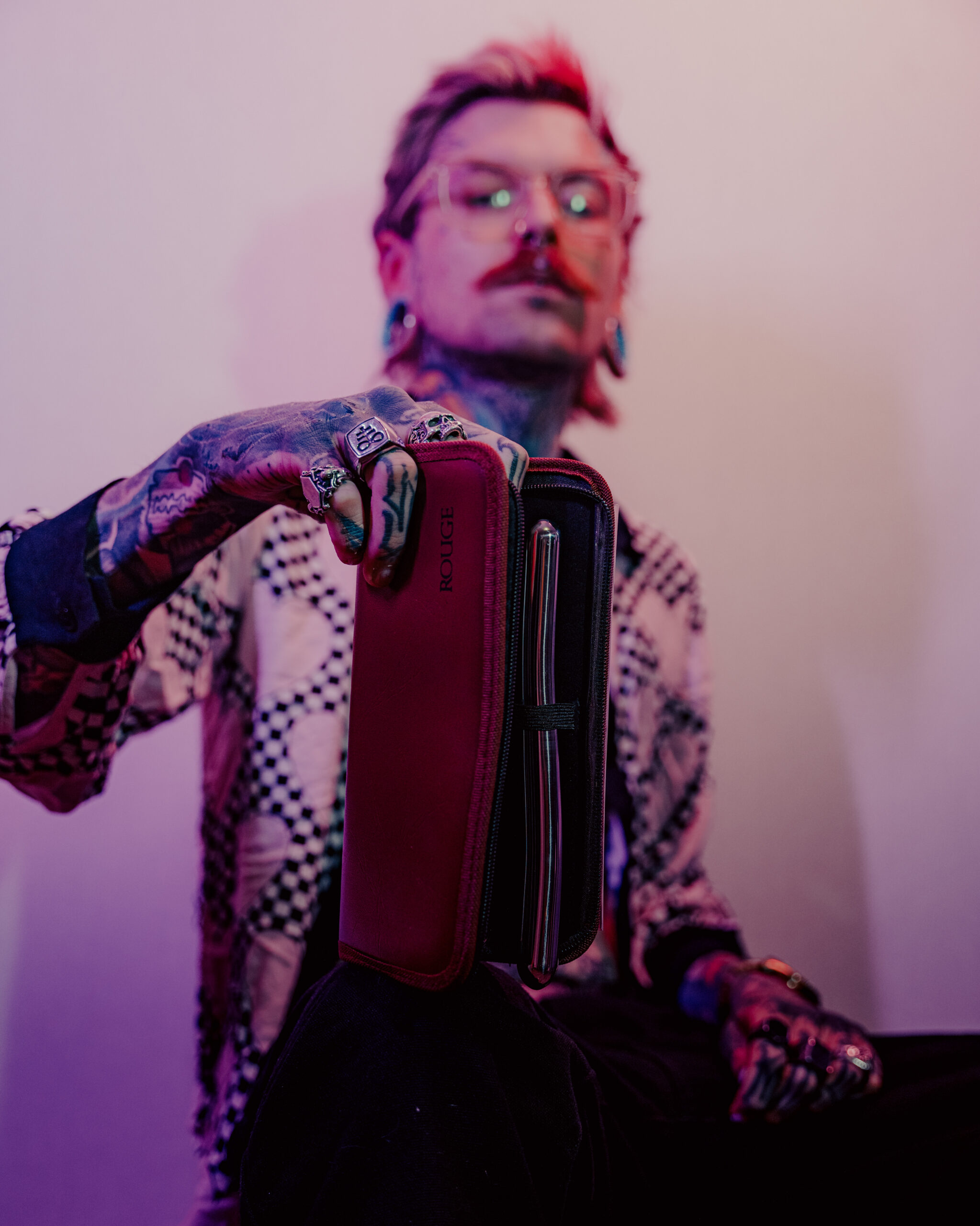Understanding Demigender
Demigender is a gender identity that describes someone who partially identifies with one gender, while not fully identifying with it. It exists on a spectrum, meaning individuals may identify as partially male, female, non-binary, or any other gender.
Think of it like a dimmer switch instead of an on/off switch for gender. Instead of feeling completely aligned with one gender, someone who is demigender might experience their gender identity as being partially aligned with a specific gender, while also feeling a disconnect from that gender to some extent.
For example, someone might identify as “demiboy” which means they partially identify as male, but not fully. This could mean they resonate with some aspects of masculinity, like certain interests or mannerisms, but still don’t feel completely male.
Similarly, someone might identify as “demigirl,” partially identifying with femininity.

Demigender identities are complex and personal. What it means to be demigender can vary greatly from person to person. Some individuals may experience their gender fluctuating or changing over time, while others may have a more stable sense of their demigender identity.
It’s important to remember that everyone’s experience with gender is unique and valid. Just like any other gender identity, demigender identities deserve respect and understanding.
Demigender refers to a broad spectrum of gender identities that are partially aligned with one or more genders, but not fully encompassing them.

Individuals who identify as demigender may experience their gender in ways that are nuanced and multifaceted.
Here’s a closer look at some common demigender identities:
-
Demiboy:** A person who partially identifies as a boy. This might mean they feel like a boy sometimes, but not always, or that their gender identity is somewhere between male and non-binary.
-
Demigirl: A person who partially identifies as a girl. Similar to demiboy, this could involve experiencing feminity in certain aspects of their lives or feeling like a mix of female and non-binary identities.
-
Demiflux: This identity describes someone whose gender fluctuates between two or more genders. Their experience might shift over time, or even within a single day.
-
Demitimes/Demipartial: These terms refer to a partial connection to a specific gender, but without being fully aligned with it.

It’s crucial to remember that demigender identities are diverse and personal. How someone expresses their demigender identity can vary widely, just like any other gender identity.
Some individuals might identify strongly with their partial gender alignment, while others might embrace it more subtly. There’s no right or wrong way to be demigender.
Understanding demigender identities has significant implications for how we approach love and relationships. It highlights the importance of recognizing that gender is a complex and multifaceted aspect of human experience.
When navigating relationships, it’s crucial to:
-
Be respectful and open-minded: Approach conversations about gender identity with curiosity and a willingness to learn.
-
Listen actively: Pay attention to how your partner expresses their demigender identity.
-
Use the correct pronouns and name: This shows respect for your partner’s chosen identity.
-
Create a safe space for communication: Encourage open and honest conversations about gender and how it influences their experiences in relationships.
By embracing the complexity of demigender identities, we can foster more inclusive and loving relationships.
Demigender & Love: Navigating the Landscape
Demigender, an umbrella term encompassing gender identities partially aligned with one or more genders, adds a layer of complexity to navigating the landscape of love and relationships.
Understanding Demigender
For individuals who identify as demigender, their gender expression and experience may fluctuate between feeling fully connected to one gender and partially connected to another.
This fluidity can manifest in various ways: identifying as a specific gender some days and less so on others, expressing gender differently depending on the context, or experiencing shifts in alignment with different genders over time.
Love & Relationships: A Personal Journey
Expressing love authentically within demigender identities requires self-awareness, understanding boundaries, and open communication.
Here are some key considerations:
*
Self-Discovery:**
Understanding one’s own demigender identity is crucial before exploring romantic relationships. This involves reflecting on personal experiences with gender, comfort levels with labels, and the ways in which gender influences feelings and expressions of love.
*
Communication:
Open and honest communication with potential partners is essential for building a strong and supportive relationship. Discussing demigender identity and its implications can help create a space where both partners feel understood and respected.
-
Acceptance and Validation:
Finding partners who are accepting and validating of demigender identities is paramount. This includes respecting how the individual chooses to express their gender, using preferred pronouns, and creating a safe space for them to be authentic.
-
Fluid Expression:
Remember that expressing love may not always align with traditional norms or expectations. It’s important to embrace the fluidity of demigender identities and explore ways of expressing love that feel genuine and meaningful.
Demigender individuals, like all people, deserve love and relationships that celebrate their authenticity. By prioritizing self-understanding, open communication, and acceptance, demigender individuals can navigate the complexities of love with confidence and create fulfilling connections.
Demigender individuals identify partially with one gender and partially with another, or as a mix of genders. This fluidity can create unique experiences when navigating the world of love and relationships.
Understanding one’s demigender identity is crucial before exploring romantic connections. It requires introspection and self-discovery to understand which pronouns feel comfortable, what attractions are present, and how gender roles might be perceived in a relationship.
Communication is paramount for demigender individuals in romantic relationships. Openly discussing their gender identity, needs, and boundaries with partners fosters understanding and respect. This can involve explaining the complexities of their gender experience and addressing any questions or concerns the partner may have.
Finding compatible partners who are accepting and understanding of demigender identities is essential for a fulfilling relationship. Look for individuals who are willing to learn and grow alongside you, respecting your fluidity and celebrating your individuality.
Navigating societal expectations around gender roles can be challenging for demigender individuals in love. It’s important to remember that these roles are socially constructed and not inherent to one’s identity. Define what feels authentic and comfortable within the relationship, regardless of traditional norms.
Support systems play a vital role in the emotional well-being of demigender individuals in love. Connecting with other LGBTQ+ individuals, joining support groups, or seeking therapy can provide a safe space to share experiences, gain insights, and receive encouragement.
Ultimately, love for demigender individuals should be based on acceptance, respect, and understanding. Finding a partner who values authenticity and embraces the complexities of their identity is key to building a healthy and fulfilling relationship.
The Impact on Relationships & Society
Demigender identities, characterized by a partial or fluctuating connection to one or more genders, present a fascinating lens through which to examine relationships and societal norms.
Traditionally, romantic relationships have often been framed within binary constructs of male and brute sex position female, leading to expectations and pressures that may not resonate with demigender individuals.
Demigender experiences challenge these binaries by expanding the spectrum of gender expression and identity, prompting a reevaluation of how we understand compatibility, attraction, and love itself.
In relationships, demigender individuals may navigate unique considerations regarding pronouns, labels, and the fluidity of their gender identity.
Open communication and understanding become paramount to fostering healthy and fulfilling connections.
Partners need to be willing to learn about and respect their loved one’s demigender identity, adapting language and behavior accordingly.
This can involve using chosen names and pronouns, actively listening to experiences and needs, and being open to evolving understandings of gender.
Furthermore, societal norms often dictate specific roles and expectations within relationships based on gender.
Demigender individuals may challenge these rigid constructs, leading to more fluid and equitable partnerships where power dynamics are negotiated with greater awareness and flexibility.
This shift can contribute to a broader societal transformation towards greater acceptance and inclusivity of diverse gender expressions and identities.
However, demigender individuals may also face discrimination, misunderstanding, or lack of support within relationships and society at large.
It is crucial to address these challenges through education, advocacy, and the creation of inclusive spaces where demigender individuals can thrive.
Ultimately, exploring demigender identity in the context of love necessitates a deeper understanding of gender fluidity, individual experiences, and the potential for evolving social norms that celebrate diversity and foster genuine connection.
Demigender identity, encompassing those who partially identify with a certain gender, presents unique nuances within the realm of relationships and societal perceptions. Understanding these intricacies is crucial for fostering inclusivity and genuine connection.
For demigenders, navigating romantic relationships can involve a spectrum of experiences. Some may seek partners who understand and respect their fluid gender identity, while others might prioritize emotional connection over strict gender norms. Open communication becomes paramount, allowing partners to establish boundaries, expectations, and ensure both individuals feel seen and validated.
Societal perceptions often play a significant role in shaping relationship dynamics. Misunderstandings or lack of awareness about demigender identities can lead to discomfort, prejudice, or even exclusion. Educating oneself and challenging societal norms that rigidly define gender roles is essential for creating a more accepting and inclusive environment for all individuals, regardless of their gender identity.
Promoting inclusivity within society requires dismantling harmful stereotypes and fostering empathy. Encouraging open dialogues about gender identity and expression can help bridge understanding and create spaces where demigenders feel safe to express themselves authentically. This includes utilizing inclusive language, respecting chosen pronouns, and actively challenging discrimination or bias.
Furthermore, representing diverse gender identities in media, literature, and popular culture can contribute significantly to normalizing demigender experiences. By showcasing the richness and complexity of human identities, we can cultivate a more accepting and equitable society where everyone feels valued and empowered to live authentically.
Find the source for full reading
Read all key insights here
- Xela Rederm Skin Booster Treatments Near Mitcham, Surrey - February 2, 2026
- Why The Craftsman Series Vape Is A Luxury Choice For Vapers - January 28, 2026
- Who Should Not Use Radiesse? - January 23, 2026
